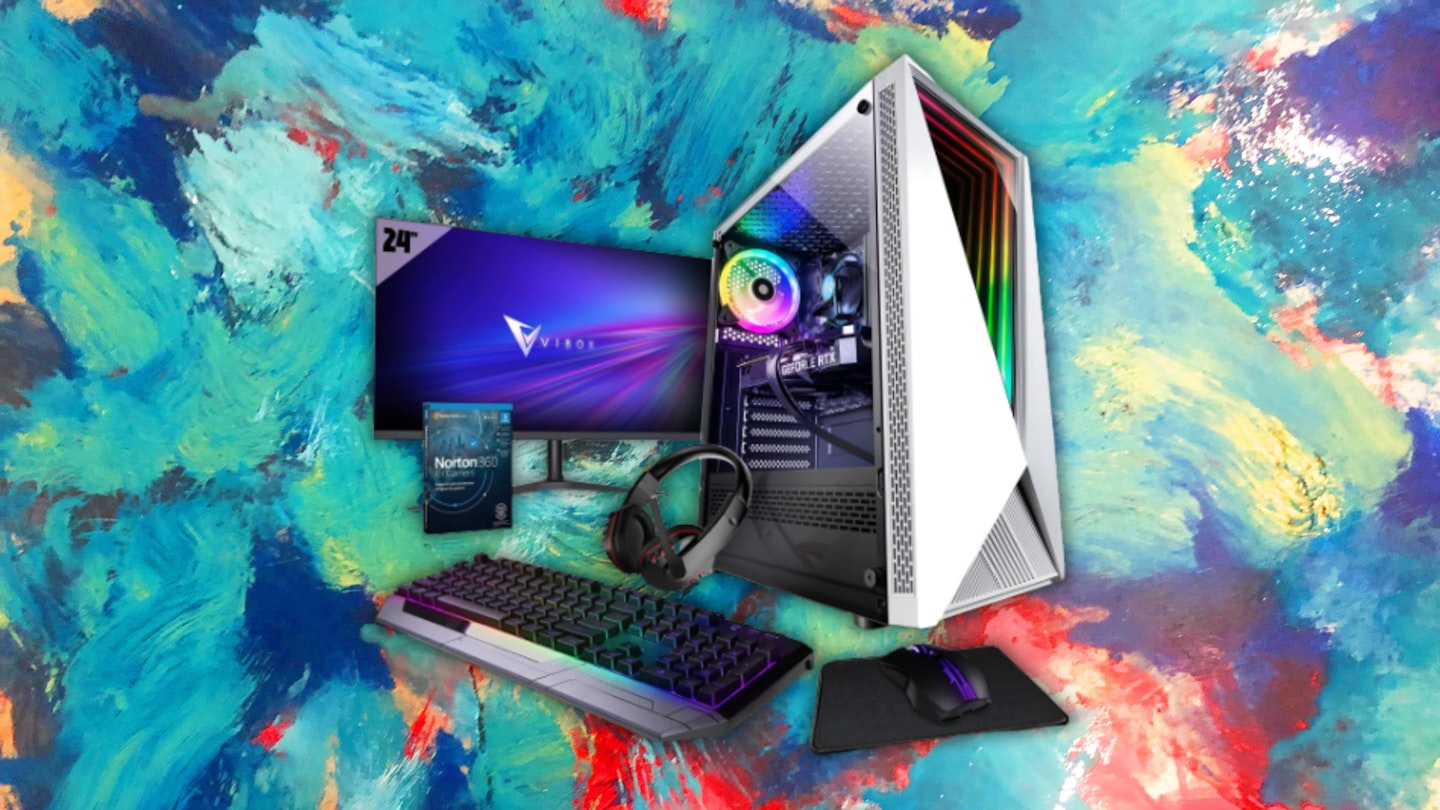Getting your hands on one of the best PCs for gaming is an incredibly exciting ordeal. Sure, consoles are an accessible method of playing the latest and greatest titles but a great budget gaming PC offers users the chance to fine-tune and enhance games they've played time and time again.
PC players have a whole new level of personalised control over practically everything – visuals, gameplay, performance – you name it. Games with unwavering popularity over the years such as Skyrim, Fallout, Dark Souls, The Witcher 3, and many more – with a bit of elbow grease and determination, these titles can be transformed in ways that are impossible on consoles.
The best budget gaming PCs at a glance:
• Best overall: ADMI | Gaming PC, Intel 12400F • RTX 4060 – View on Amazon
• Best budget: Veno Scorp Gaming PC – View on Amazon
• Best under £600: ADMI | Gaming PC, Ryzen 5500 – View on Amazon
• Best for RAM: AWD-IT Charger White, AMD Ryzen 5500 – View on AWD-IT
As a PC gamer, you'll have access to the world's largest and most competitive gamer base – so you'll be competing against the best in whatever e-sport you fancy. From FPSs such as CS: GO, PUBG, and Call of Duty to MOBAs like League of Legends and Dota 2 – you'll have your pick of great teammates and even tougher opponents.
Many people build their own PC, often heralded as a more cost-effective way of getting into high-spec PC gaming. With the right skills and time on your hands, this is certainly true but in a world already heavy with jargon, abbreviations and acronyms, a custom build can feel like an exhausting and frankly terrifying experience. Thankfully, however, there are more than enough options for gamers who are less technologically inclined. There are hundreds of fantastic options for PCs at incredibly low prices.
For gamers on a tight budget, we’ve rounded up the best gaming PCs for under £750 (and some PCs under £500). Each and every one of our favourite picks is capable of holding their own, even with modern AAA games being as demanding as they are.
Best budget gaming PCs of 2024:
Please note: All prices correct at time of writing. Prices, stock and deals subject to change without notice.
Best overall
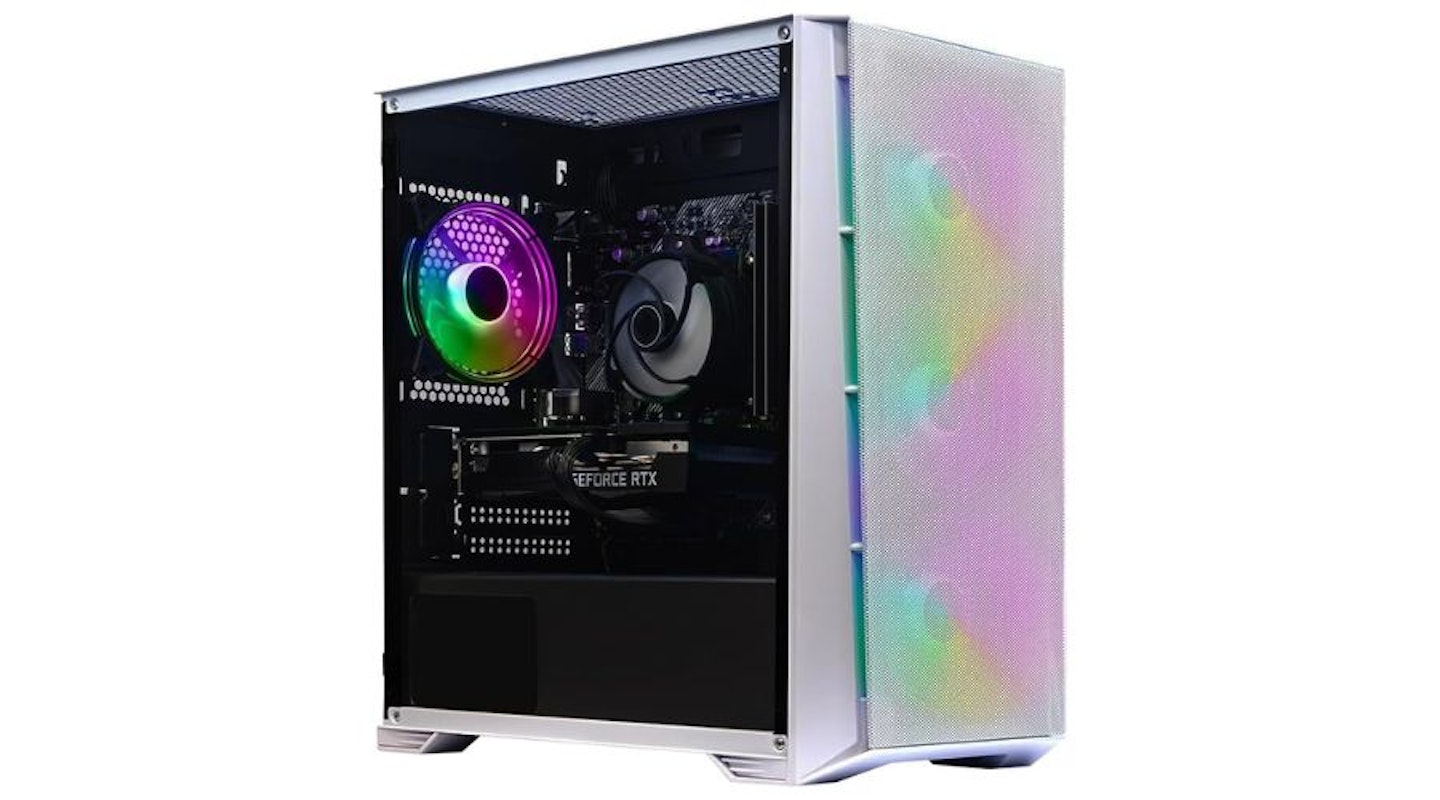 ADMI
ADMIA strong contender for one of the best budget gaming PC builds of the year, the ADMI 4060 gaming PC is comprised of strong hardware which, on initial glance, exceeds this budget PC's low price. Utilising impressive SSD storage with a spacious 1TB, as well as 16GB of RAM which is unlikely to struggle with high-end games, and the icing on the cake – a monstrous RTX 4060 GPU with 8GB of VRAM, it's hardly a surprise that it's one of our favourites this year.
Balanced hardware built well with professional-grade cable sorting, the ADMI gaming PC is truly stunning, with little room for criticism. If we were to truly nitpick, we'd certainly consider upgrading the ADMI's 12th generation Intel i5 CPU in time –it's a solid CPU undoubtedly, but to truly push the boat out on performance, using something a little more recent would truly heighten your gaming experience.
Again, we're largely scraping for downsides here – the Intel i5 CPU is remarkably solid, and when used with the ADMI's other hardware, there's no doubt that you'll be tearing through waves of foes in stunning 4K resolution, without a hitch before long.
Pros
- Excellent 4060 GPU
- Strong design and build quality
- Great SSD storage for quick game bootup
Cons
- Slightly older CPU onboard
| CPU | Intel i5 12400F |
| GPU | RTX 4060 8GB GDDR5 |
| RAM | 16GB |
| Storage | 1TB SSD |
| Dimensions | Not specified |
| Weight | Not specified |
Best budget
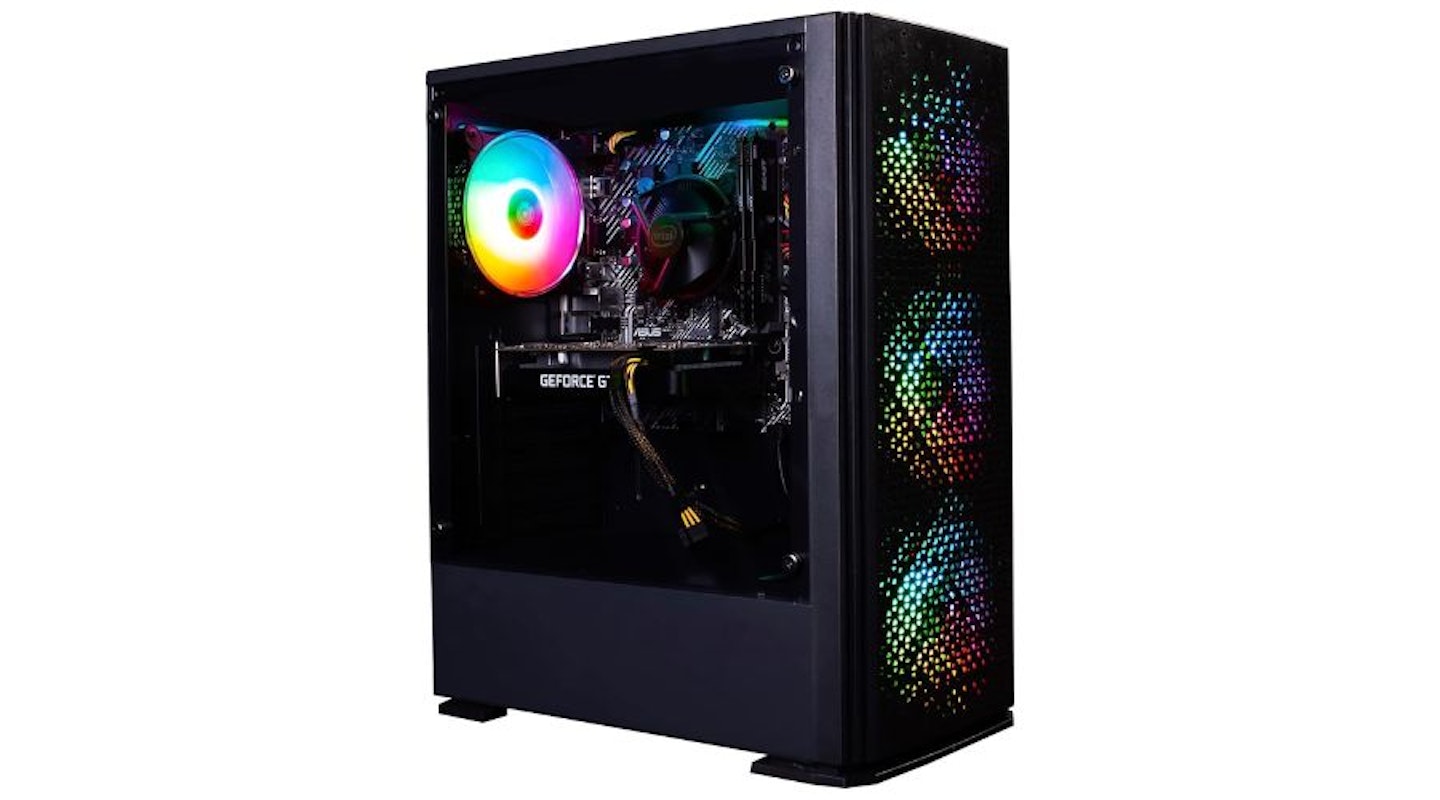 Veno Scorp
Veno ScorpMade for gamers in dire need of a punchy setup, but without a heap of cash to spend – the Veno Scorp Gaming PC is a steal that'll cover any player's need for a quality setup.
Capable of handling its fair share of AAA games in its sleep, this Veno Scorp Gaming PC build is an absolutely baffling deal that budget gamers need to get their hands on this year. From its sensational 16GB of RAM to its solid Intel i7 CPU, the Veno Scorp offers some promising hardware potential for exciting AAA gaming. Still, this budget gaming PC isn't without its limits.
A particular weakness of this build is the reliance on a hybrid storage system – utilising both HDD and SSD, with most of the storage itself being HDD, you're not getting the best storage in terms of speed, despite the 1TB of HDD storage. Using HDD storage will limit quick access to games, extending loading times, which is especially crucial in open-world games.
Of course, the unique benefit of a gaming PC is its customisability, should you want to upgrade the SSD, simply take out the HDD and swap it out, it's that simple. Out of the box, however, the use of HDD leaves much to be desired.
Veno Scorp's budget gaming PC is a bargain at its price, with few PCs online truly competing with its impressive GPU and reliable i7 CPU processor.
Pros
- Hardy, reliable build quality
- Exceptional performance for its price
- Great case with plenty of RGB lighting
Cons
- Hybrid storage is a little dated
| CPU | i7-3770 |
| GPU | GeForce GT 710 2GB |
| RAM | 16GB |
| Storage | 1TB HDD, 256GB SSD |
| Dimensions | Not specified |
| Weight | Not specified |
Best under £600
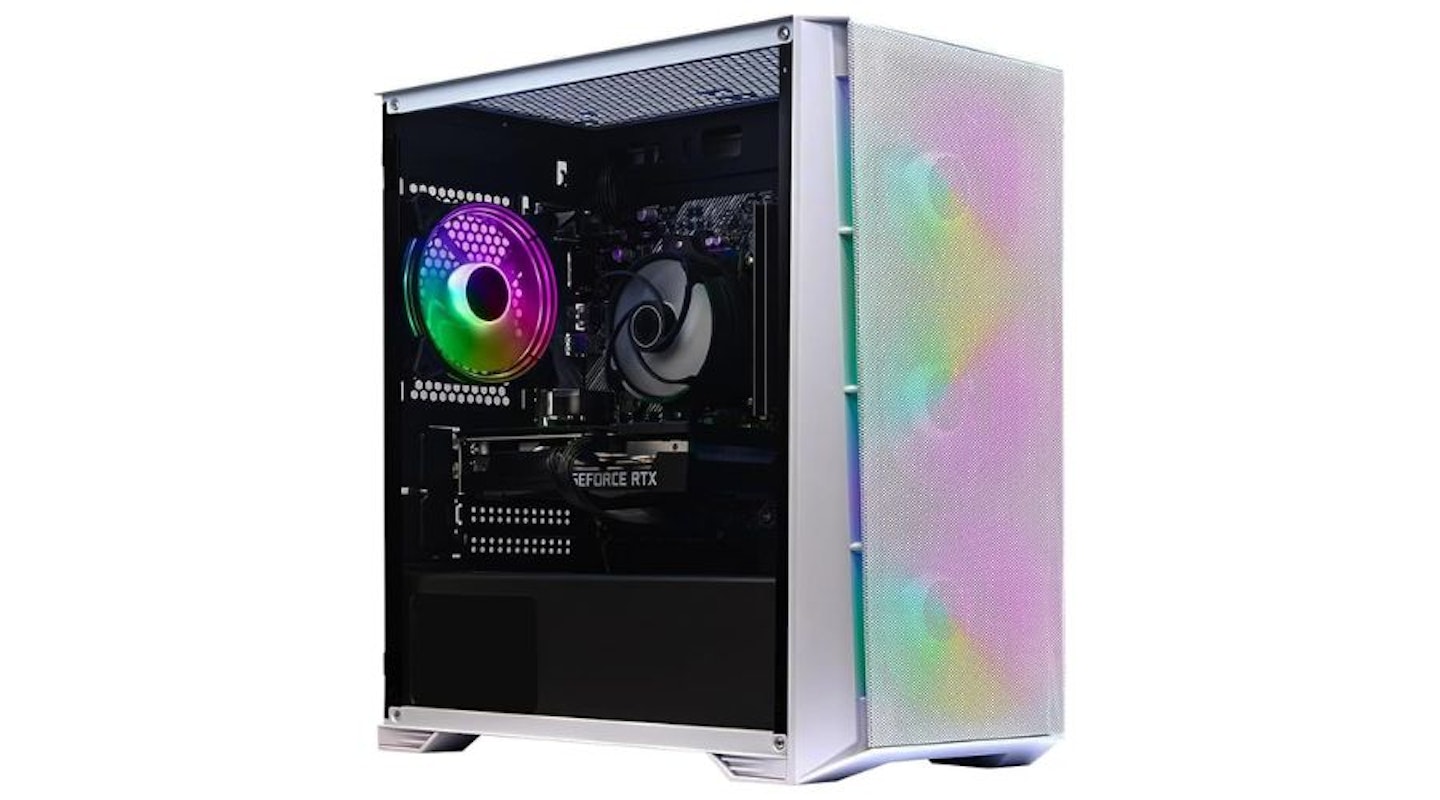 ADMI
ADMIOut of the gate, this ADMI PC build has an NVIDIA RTX 3050 8GB graphics card - giving you plenty of potency for some serious gaming performance. Joining the magnificent graphics card is the ADMI's plethora of reliable hardware; an AMD Ryzen 5500 CPU, 16GB of RAM and a 1TB SSD, which isn't perfect, but certainly offers strong performance even amongst the most demanding modern games.
perhaps the most prominent weakness of this PC build is the ADMI's Ryzen 5500 CPU, a popular, yet limited budget CPU which struggles to go toe-to-toe with Intel's 12th-generation i5. Performance lags behind slightly, despite having a similar amount of cores. Its clock speed is perhaps the weakest aspect of the Ryzen 5500 CPU, and it leaves the general operation of the PC slightly lagging behind, despite its otherwise strong hardware
Concerning design and construction, ADMI's Gaming PC's vivid white mesh case certainly stands out from the crowd, and once activated, RGB fans will have more than their fair share of colours to choose from.
For its sheer value – there's nothing you can truly fault with ADMI's seriously good 3050 build, its brilliance is simply obvious, and we cannot recommend it enough.
Pros
- Excellent value
- Great GPU
- Solid PC case
Cons
- Weaker CPU performance
| CPU | AMD Ryzen 5500 |
| GPU | NVIDIA RTX 3050 8GB |
| RAM | 16GB |
| Storage | 1TB NVME SSD |
| Dimensions | 610 x 492 x 417.9 mm (H x W x D) |
| Weight | 10.5kg |
Best RAM
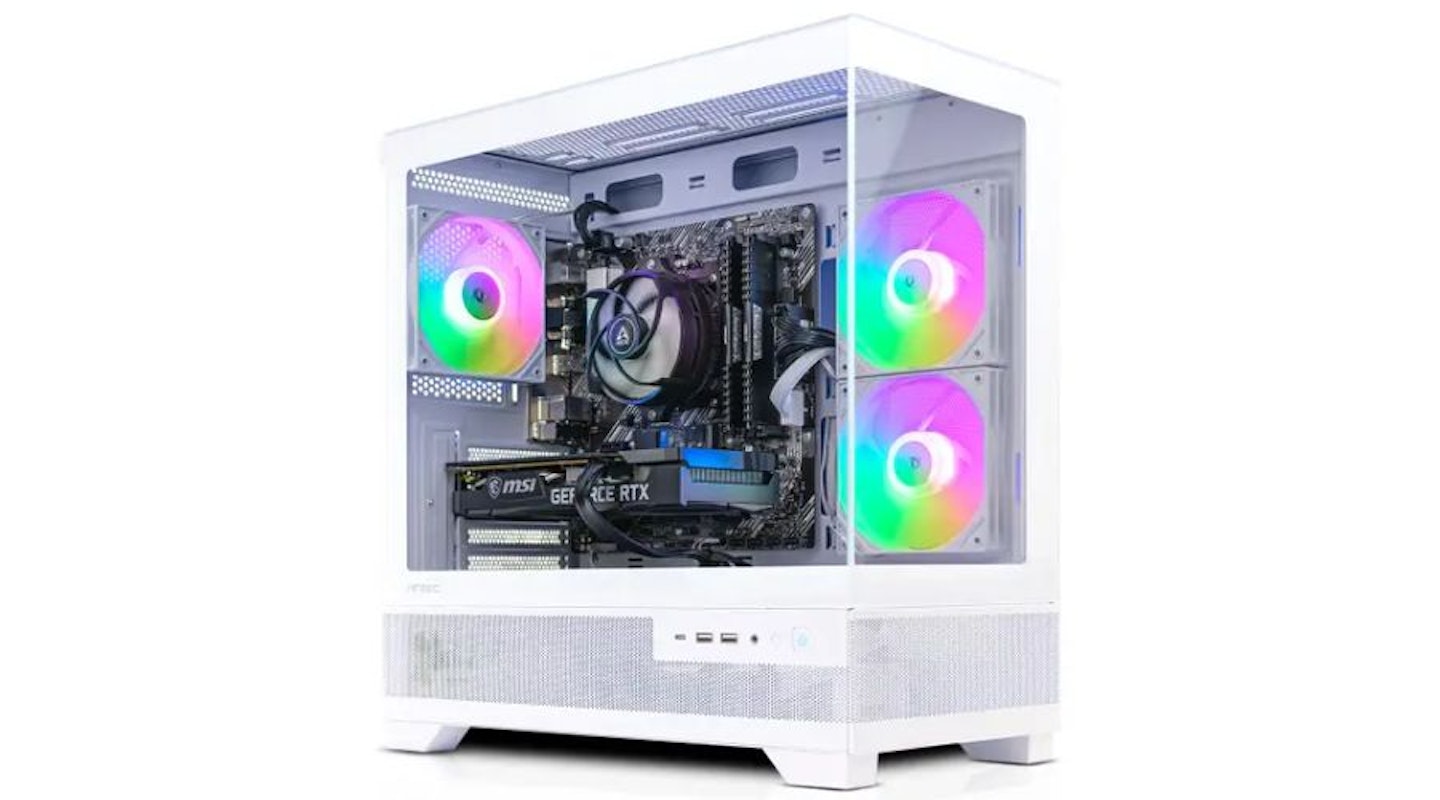 AWD-IT
AWD-ITwww.awd-it.co.uk
Dipping in price recently, the AWD-IT Charger is likely to be one of the strongest budget PCs on the market this year, comfortably sitting below the £700 price point whilst being equipped with some of the best hardware of the year.
Starting strong with storage, the 1TB of SSD storage is perfectly ideal for gamers with a library's worth of larger AAA titles such as Call of Duty, so you're far less likely to need a thorough clean-out at any point. Capturing the excitement of gamers most of all has to be its RTX 3060 card with an unparalleled 12GB of VRAM, vastly competing with most graphics cards available at its price. With the RTX, smooth next-generation gaming and access to ray tracing are a possibility, so grabbing this PC setup is a little extra worthwhile.
The AWD-IT Charger's particularly strong 16GB of RAM is certainly commendable, but it's undeniably made stronger by the presence of the AWD-IT's particularly high VRAM. This is because, when VRAM becomes overloaded during gaming, which is more likely to happen than ever before in modern gaming, the PC uses the main RAM as an overflow, which is why having plenty is a necessity. Having 16GB of RAM ensures that you're undoubtedly going to have enough for strong performance.
The major downside of the AWD-IT Charger is undeniably its fairly average AMD 5500 CPU, certainly one of the cheaper components onboard which isn't the best for gaming. A good amount of cores but a slower clock speed means that the AWD-IT charger does well while multitasking, but doesn't complete those individual tasks with a great amount of speed.
And yet, for all intents and purposes, the AWD-IT Charger is doubtlessly ahead of the curve for performance, leaving few stones unturned to provide the best performance possible at its budget price.
Pros
- Excellent RAM
- Strong GPU with 12GB of VRAM
- Gorgeous RGB case
Cons
- Fairly weak CPU
| CPU | AMD Ryzen 5500 |
| GPU | NVIDIA RTX 3060 12GB |
| RAM | 16GB |
| Storage | 1TB NVME SSD |
| Dimensions | 391 x 229 x 396 mm (H x W x D) |
| Weight | Not specified |
Best for simple gaming
Easily one of the best rigs we've come across this year for simple, non-AAA gaming, this MEDION Erazer gaming PC with an Intel Core i5 processor, 512GB SSD and 16GB of RAM is a true bargain. But it's not the stellar memory, nor the CPU that excites us, it's the NVIDIA GeForce GTX 1650 4 GB graphics card.
With a strong budget graphics card, you're not going to get the performance you might find on a 30-series card, but for what it's worth, you'll get plenty of performance from the 1650 GPU. We'd certainly recommend playing at full-HD resolution with this graphics card for the best performance.
The Intel i5 12400F CPU isn't the most remarkable CPU on the market, but for a budget build as cheap as the MEDION Erzer, it's certainly one of the stronger components of this rig.
Needless to say, the performance on the MEDION Erazer gaming PC is excellent for the price, there are very few games that you'll struggle to run, which is an achievement considering its affordable price.
Pros
- Balanced set of specs
- The sleek and subtle design doesn't demand too much attention
- Respectable GPU for the price
Cons
- CPU has a slower clock speed than some competitors
| CPU | Intel Core i5-12400 Processor |
| GPU | NVIDIA GeForce GTX 1650 4 GB |
| RAM | 16GB |
| Storage | 512GB SSD |
| Dimensions | Unspecified |
| Weight | Unspecified |
Best midrange
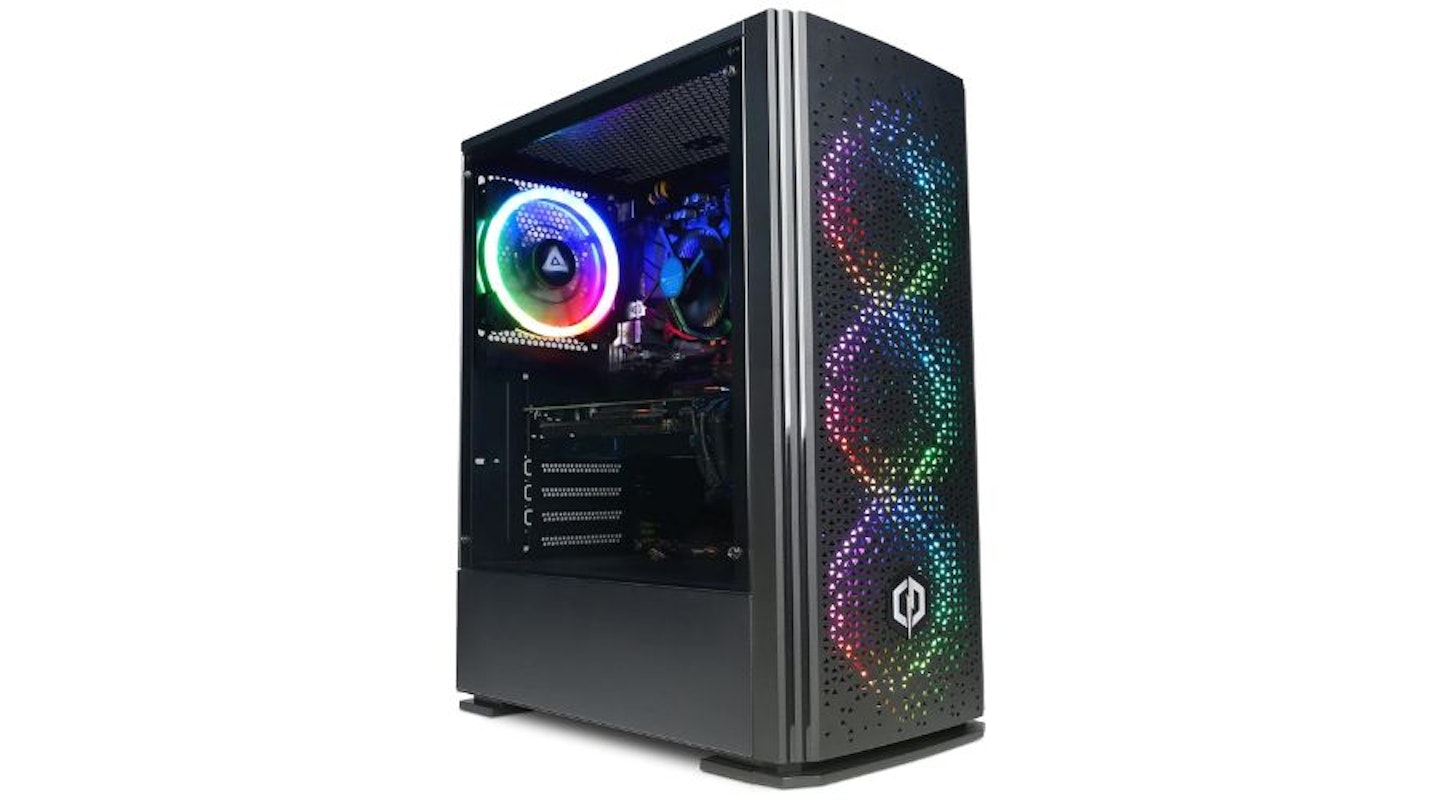 CYBERPOWERPC
CYBERPOWERPCA mainstay of budget PC builders, CyberpowerPC and its Wyvern mid-range models have cropped up consistently on PC roundups for years now, and the latest generation is unequivocally the best we've seen for the price.
Well-priced at around £650, the Wyven's excellence largely stems from its stellar NVIDIA RTX 3060 GPU with 12GB of VRAM, a card more than capable of holding its own against the next generation of AAA games. Ray-tracing, 4K ready and truly next-level compared to a multitude of similarly-priced PC builds, the Wyvern more than delivers out of the gate with just this impressive graphics card alone.
As for its memory, the 16GB of RAM is certainly strong, keeping intensive games afloat with its ample space. The 500GB of SSD storage on the Wyvern, while quick, doesn't provide a whole lot of room for newer games, which are all the more demanding on storage. Thanks to the PC's excellent case, however, upgrading the CyberpowerPC's storage is a breeze.
What may be a little more disappointing to gamers is the AMD Ryzen 4500 CPU, which certainly leaves us wanting for a little more clock speed to get the most out of games. This cheap CPU is an outlier in this build and is likely to cause a degree of bottlenecking, which doesn't bode well if you're looking for top-tier performance.
That being said, for the card alone, alongside the stellar build quality and the sheer value of this PC build, the CyberpowerPC Wyvern is amongst the best of the year, offering strong performance, consistent stability and plenty of gorgeous aesthetics to scratch your RGB itch.
Pros
- Amazing graphics card
- Gorgeous case with plenty of connectivity
- Well-assembled and reliable
Cons
- Not the most impressive storage
| CPU | AMD Ryzen 5 4500 |
| GPU | NVIDIA RTX 3060 12GB GPU |
| RAM | 16GB |
| Storage | 500GB |
| Dimensions | 416 x 217 x 362 mm (H x W x D) |
| Weight | 12kg |
Best bundle
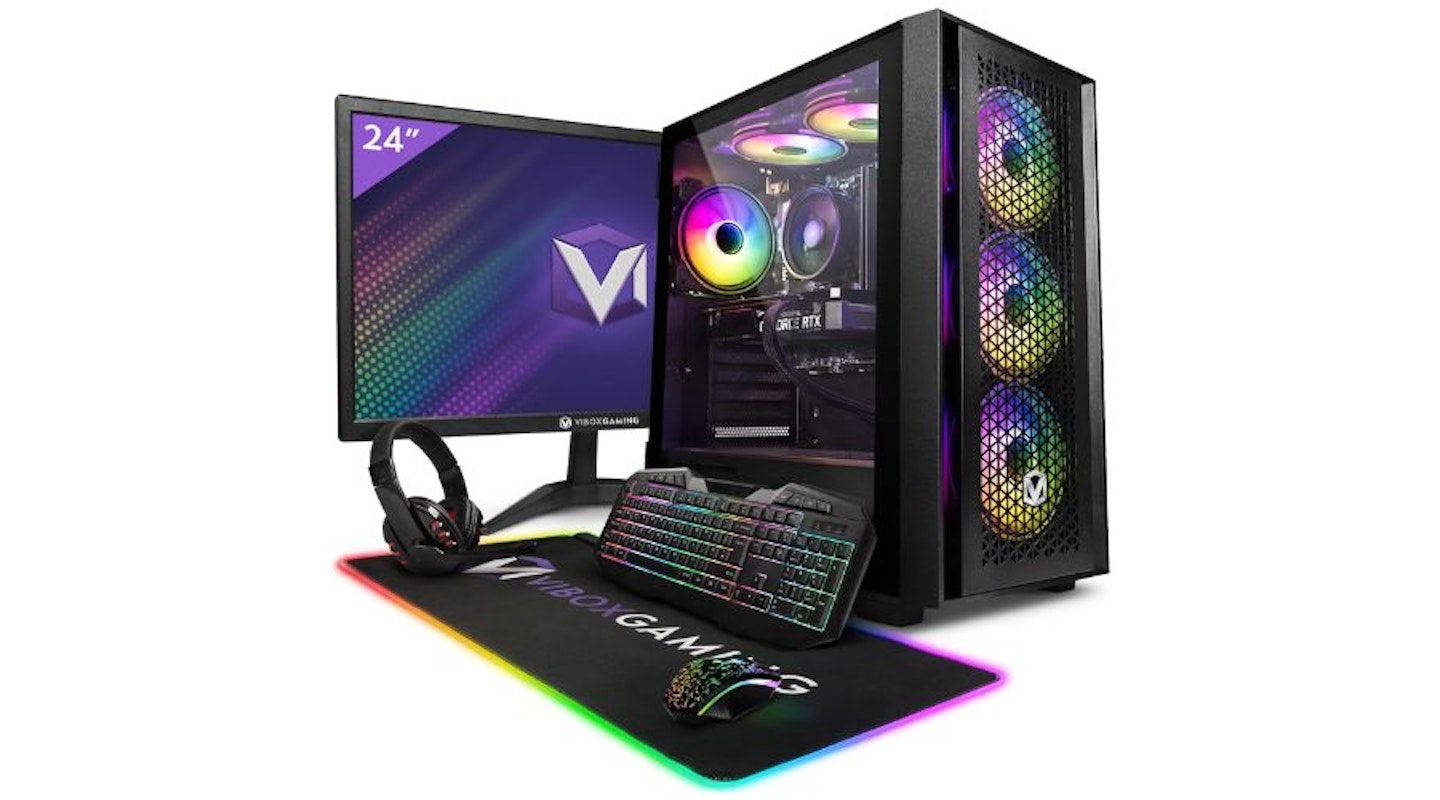 Vibox
ViboxPurchasing a gaming PC is expensive enough, so choosing a bundle is a fantastic way of drastically cutting back your PC setup budget, but it's not without its potential risks. Of course, typical PC bundles have to cut back somewhere, so getting a strong gaming PC that's also less than £750 can be tough, but Vibox has certainly managed to pull it off.
The Vibox V-8 is a fantastic, cheap and reliable gaming PC which unquestionably deserves a spot on this year's roundup. Out of the gate, this budget build is equipped with an NVIDIA 3050 GPU with 6GB of VRAM, so there's no doubt that delving into larger, more demanding games is a breeze for this setup.
Paired with 16GB of RAM and an impressive 1TB of SSD storage, it becomes a little confusing as to why this PC build is so cheap, and yet still comes with an array of peripherals too. The CPU, while not the strongest, fits this budget build well, there are undeniably going to be cutbacks in places, and the CPU is likely the best component to reduce spending on, so it's a logical choice on Vibox's behalf.
Where the lower price becomes apparent is the actual quality of the peripherals – the included mouse, keyboard, monitor and mouse mat aren't the best you can buy, that's a given. The mouse is a little ugly and the monitor itself doesn't do a whole lot for the visuals of modern games. It's still a 1080p screen, which looks great, but you're going to notice its less than top-tier quality.
But, if you're shopping on a budget and want to get going on gaming as soon as possible, then you can certainly start with this fantastic setup from Vibox, it's one of the best bundles we've come across and is more than worth its great value price.
Pros
- Fantastic value bundle
- Strong 3050 GPU
- Impressive 1TB SSD storage
Cons
- Peripherals aren't the best quality
| CPU | AMD Ryzen 5 4500 |
| GPU | Nvidia RTX 3050 6GB |
| RAM | 16GB |
| Storage | 1TB SSD |
| Dimensions | PC – 400 x 190 x 440 mm (H x W x D), Monitor – 24 inches |
| Weight | 12 kg |
Best bundle under £750
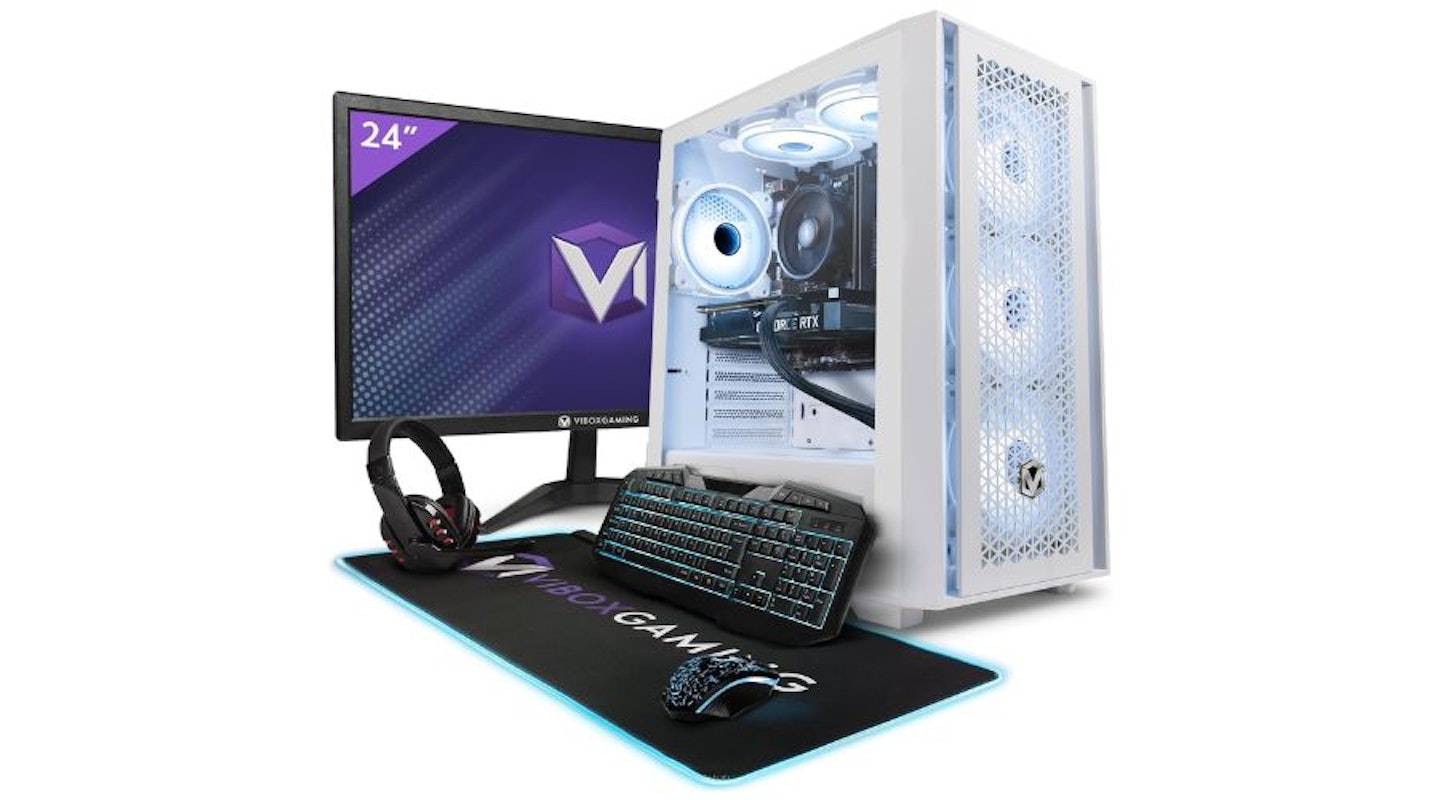 Vibox
ViboxCertainly, one of the more attractive bundle PC builds, the Vibox V-24 is certainly on the cheaper end of the PC bundle spectrum, with hardware that isn't groundbreaking but is certainly going to provide strong full-HD gameplay.
Running an NVIDIA 1650 GPU with a semi-decent 4GB of RAM, alongside a full terabyte of SSD storage, you can expect solid performance across an array of newer games, with stable performance in an array of FPS games. The Ryzen 5 CPU is decent, but not the most impressive, and will provide a strong degree of reliable multitasking, with some bottlenecking of the Vibox's more powerful GPU.
While the main PC case looks fantastic, the peripherals are typical Vibox peripherals, which certainly feel on the cheaper end. Yes, the full-size keyboard is good, but it's undoubtedly designed as a beginner keyboard to get you started without having to wait for a decent keyboard.
Looking at the true value of the Vibox V-24, you really cannot fault the V-24 for its minor shortcomings, it's a fantastic gaming PC, and when everything's included - the bargain this bundle is, truly is apparent.
Pros
- Great value bundle
- Solid rig overall
- Great for a beginner PC
Cons
- Budget peripherals feel cheap
| CPU | AMD Ryzen 5 4500 |
| GPU | NVIDIA GTX 1650 Super 4GB GPU |
| RAM | 16GB |
| Storage | 1TB SSD |
| Dimensions | 362 x 200 x 426 mm |
| Weight | 15kg |
Best GPU
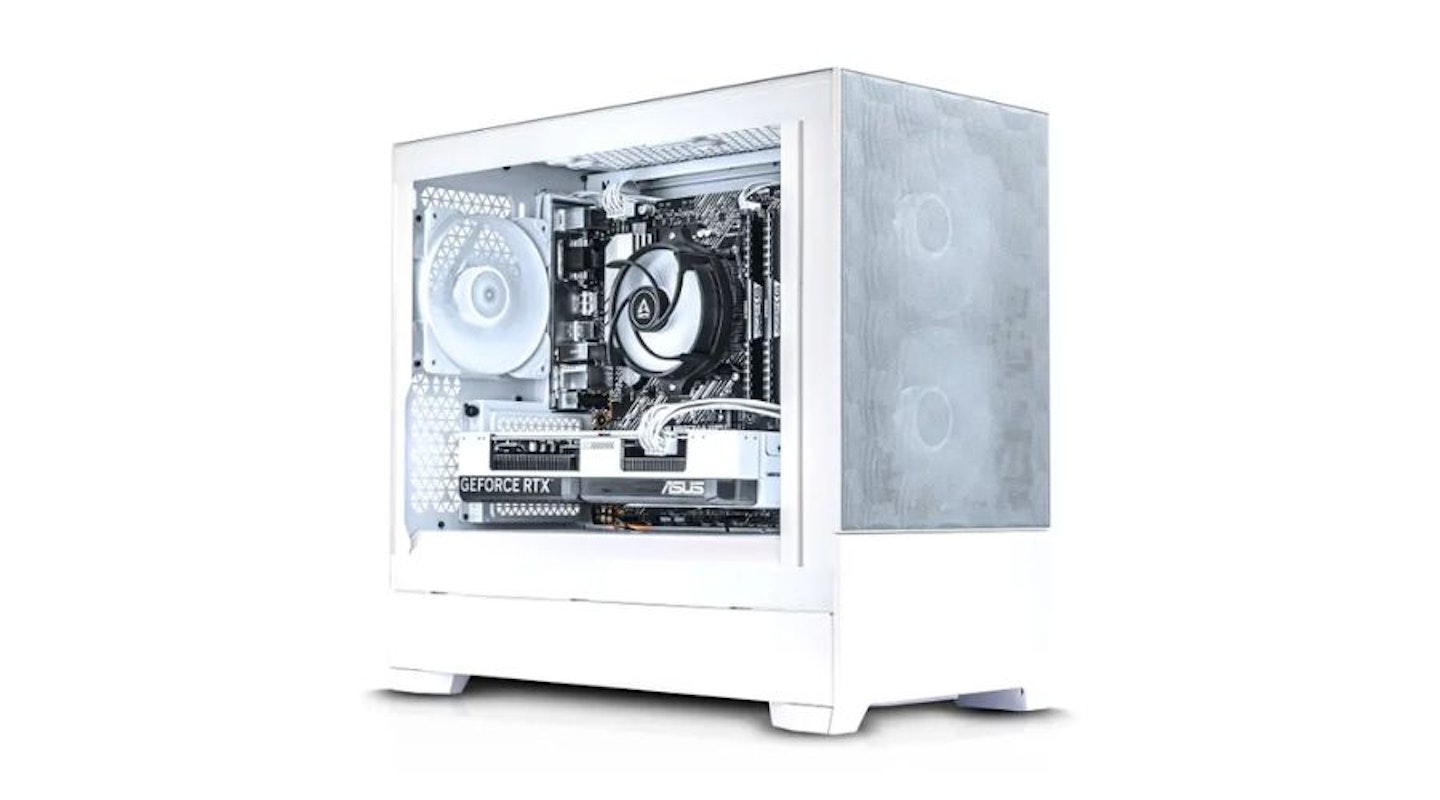 AWD-IT
AWD-ITwww.awd-it.co.uk
For under £750, it's tough to find a build with a 40-series graphics card onboard, but AWD-IT's FROST gaming PC certainly manages to pull it off. This utterly phenomenal build steals the show with its stunning, well-ventilated case and tidy build, but the monstrous graphics card brings this PC to a whole new level.
With the 4060 GPU, expect to game at 4K quality without a hitch, crank up your settings on the latest games and explore the gorgeous vistas of modern gaming to your heart's content. The only caveat to this PC's terrific graphics card is its lower-end AMD Ryzen 5 5500 CPU and 500GB of SSD storage, which certainly don't meet the same sheer excellence.
Bottlenecking is likely on this PC build, but with 16GB of RAM and the full-throttle of the GPU on its side, performance remains strong, there's no doubt about it. An excellent gaming PC deal worth investing in, grab this PC for a next-generation experience.
Pros
- Phenomenal 4060 graphics card
- Stunning white case
- Excellent value build
Cons
- Fairly low 500GB of SSD storage
| CPU | AMD Ryzen 5 5500 |
| GPU | NVIDIA GeForce RTX 4060 |
| RAM | 16GB |
| Storage | 512GB SSD |
| Dimensions | 400 x 210 x 402 mm (H x W x D) |
| Weight | Not specified |
Best overall under £500
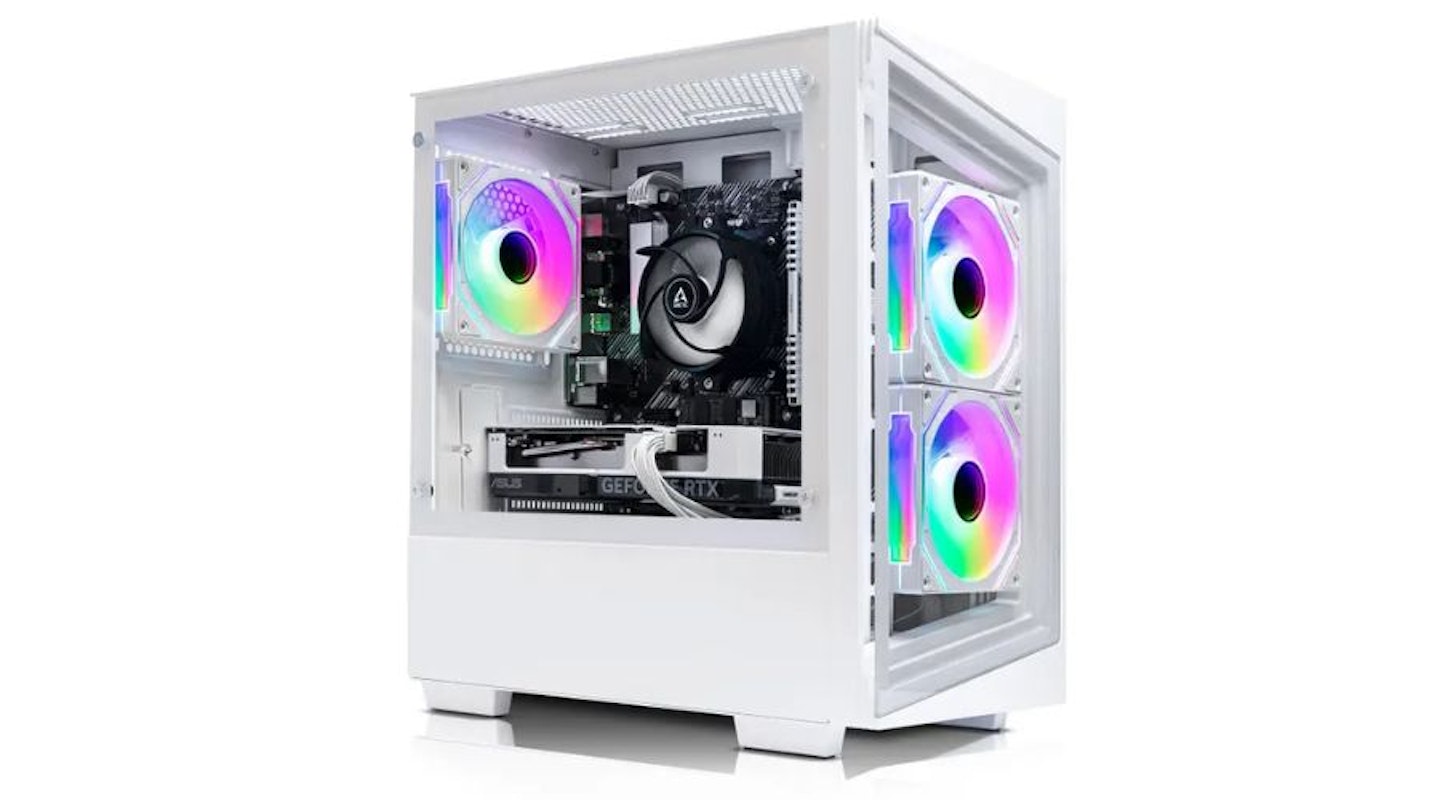 AWD-IT
AWD-ITwww.awd-it.co.uk
Almost certainly one of the best budget gaming PCs for less than £500, the AWD-IT LEVEL 3 gaming PC has some impressive hardware, a great design and plenty to offer gamers looking to delve into some of the most heart-racing games of the year.
The strongest of the LEVEL 3's hardware has to be its NVIDIA 1650 4GB GPU, which isn't the best on our list, but typically performs well with even more recent AAA games. Choosing to play less-demanding games such as Fortnite and Call of Duty are bound to be a good choice for this build, with more demanding open-world games running into some issues.
These performance issues are largely the fault of the lower-end AMD Ryzen 5 3600 CPU, which is on the lower end of hardware on our roundup. It's a cheaper CPU to be sure, but will perform well when paired with a higher-end GPU and a strong 16GB of RAM. The storage, while not spectacular is certainly enough to start off, storage is incredibly easy and affordable to upgrade too, so it's not a major deal in the long run.
For those starting their PC gaming journey, this brilliant PC deal is bound to be the perfect foot in the door, strong hardware, a great aesthetic and well-made, this might be the perfect PC for under £500.
Pros
- Excellent value gaming PC
- Strong graphics card
- Great 16GB of RAM
Cons
- Weaker CPU
| CPU | AMD Ryzen 5 3600 |
| GPU | Nvidia GTX 1650 4GB |
| RAM | 16GB |
| Storage | 512GB |
| Dimensions | Not specified |
| Weight | Not specified |
How to choose the best budget gaming PCs:
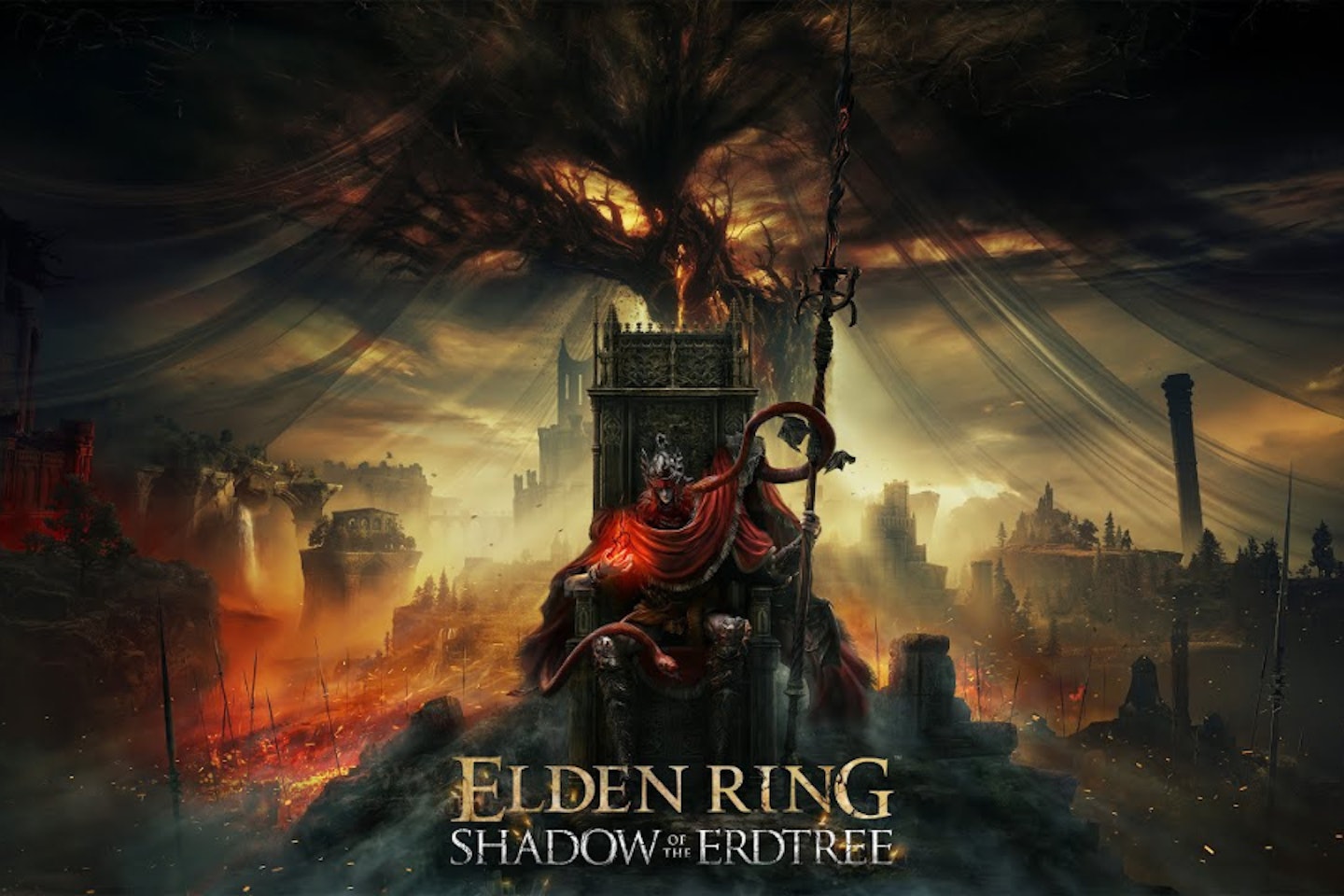
Popular Game Specs Quick Reference Guide
Specifications as reported by wepc.com
Fortnite
• CPU – Minimum: Core i3 2.4GHz / Recommended: Core i5 2.8GHz
• RAM – Minimum: 4GB RAM / Recommended: 8GB RAM
• Storage – Required: 16GB free space
• GPU – Minimum: Intel HD 4000 (integrated graphics) / Recommended: Nvidia GeForce GTX 660, AMD Radeon HD 7870, or equivalent with 2GB memory or higher VRAM.
• OS – Required: Windows 7, 8.1, or 64-bit Windows 10
Call Of Duty: Modern Warfare III
• CPU – Minimum: Intel Core i5-6600 or AMD Ryzen 5 1400 / Recommended: Intel Core i7-6700K or AMD Ryzen 5 1600X
• RAM – Minimum: 8GB RAM / Recommended: 16GB RAM
• Storage – Required: SSD with 149GB available space (78GB if COD HQ and Warzone are already installed)
• GPU – Minimum: NVIDIA GeForce GTX 960 / GTX 1650 or AMD Radeon RX 470 / Recommended: NVIDIA GeForce GTX 1080Ti / RTQ 3060 or AMD Radeon RX 6600XT
• OS – Minimum: Windows 10 64 Bit (latest update) / Recommended: Windows 10 64 Bit (latest update) or Windows 11 64 Bit (latest update)
Elden Ring
• CPU – Minimum: Intel Core i5-8400, AMD Ryzen 3 3300X / Recommended: Intel Core i7-8700K, AMD Ryzen 5 3600X
• RAM – Minimum: 12GB RAM / Recommended: 16GB RAM
• Storage – Required: 60 GB of storage space
• GPU – Minimum: NVIDIA GeForce GTX 1060, 3GB or AMD Radeon RX 580, 4GB / Recommended: NVIDIA GeForce GTX 1073, 8GB or AMD Radeon RX Vega 56, 8GB
• OS – Minimum: 64-bit Windows 10 / Recommended: 64-bit Windows 10
Dragon's Dogma II
• CPU – Minimum: Intel Core i5 10600 or AMD Ryzen 5 3600 / Recommended: Intel Core i7-10700 or AMD Ryzen 5 3600X
• RAM – Minimum: 16GB RAM / Recommended: 16GB RAM
• Storage – Required: 70 GB of storage space
• GPU – Minimum: NVIDIA GeForce GTX 1070 or AMD Radeon RX 5500 XT / Recommended: NVIDIA GeForce RTX 2080 or AMD Radeon RX 6700
• OS – Minimum: 64-bit Windows 10 or Windows 11 / Recommended: 64-bit Windows 10 or Windows 11
Baldur's Gate 3
• CPU – Minimum: Intel Core i5 4690 or AMD FX 8350 / Recommended: Intel Core i7 8700K or AMD Ryzen 5 3600
• RAM – Minimum: 8GB RAM / Recommended: 16GB RAM
• Storage – Required: 150 GB of storage space
• GPU – Minimum: NVIDIA GeForce GTX 970 or AMD Radeon RX 480 / Recommended: NVIDIA GeForce RTX 2060 Super or AMD Radeon RX 5700 XT
• OS – Minimum: 64-bit Windows 10 / Recommended: 64-bit Windows 10
Terminology 101:
CPU
A Central Processing Unit, or CPU, processes and executes instructions. Processors often consist of multiple cores, and the higher the number of cores the more processes it can carry out, improving performance. CPU is clock speed is also important, and is measured in GHz. Typically, an average gamer will want between 3.5Ghz and 4GHz.
RAM
Random Access Memory, or RAM, is a component that temporarily holds bytes of information for quick and random access by the CPU. The information will be related to programs and services that are in use. The more RAM available, the more quick-access information there is available to the CPU, thereby improving computer performance.
Gamers will want no less than 8GB of RAM.
DDR3 RAM versus DDR4 RAM
DDR3 and DDR4 are generations of RAM. DDR3 was introduced in 2007, and DDR4 in 2014. The main differences between the two relate to the voltage used, latency times, clock speeds, and overall performance. For most entry-level users, the variations between the two will not matter, as both perform very well. The difference becomes more important when upgrading motherboards, CPUs, and RAM, as the two types cannot be interchanged or exchanged. Newer machines tend to use DDR4, though DDR3 is still readily available and can be more affordable.
In recent years, many high-end PCs have switched over to DDR5 RAM, which has a 50 per cent bandwidth increase from DDR4 RAM, but is significantly more expensive - but you can never have too much memory bandwidth.
Graphics cards
A graphics card’s job is to convert CPU data into visual output. There are many types, specifications, and sizes of graphics cards. Typically, these cards have dedicated RAM, processor(s), fans and heat-syncing solutions. Sometimes graphics cards are referred to as GPUs, which is just an abbreviation of the card's processor name, a Graphics Processing Unit.
Dedicated graphics cards improve the visual experience and improve a PC’s overall performance – they are seen as essential components for gamers.
Some CPUs and motherboards have in-built graphics cards. While acceptable for standard computer usage, these in-built options are insufficient for high-performance gaming, especially when compared with dedicated graphics cards.
When hunting down your gaming PC's components, most of the expense is almost certainly going to be on your beloved graphics card. Here are the best graphics cards of the year.
What is the difference between HDD and SSD memory?
Hard drive disks (HDD) are mechanical, writing, and reading information on spinning disks (or platters) via an actuator arm, which moves across the platter. The platters are broken down into a series of tracks and sectors. It's within these that data is stored and addressed with a location.
Solid State Drives (SSD) write and read using flash memory, much like USB flash drives. Data is stored in grids and blocks, and though the process is more complicated than in HDD, the available space is utilised more efficiently thanks to a series of processes that go on behind the scenes.
HDD is reliable, though they are large and rely on mechanical procedures to store, write and read memory. SSD is a newer technology and uses no moving parts: it's far quicker at data retrieval, is smaller in size, and runs more efficiently. SSDs are popular within the gaming community due to their rapid load times. HDDs are cheaper and are available with much larger storage capacities.
It is common practice within the gaming community to have both an SSD and HDD in a build.
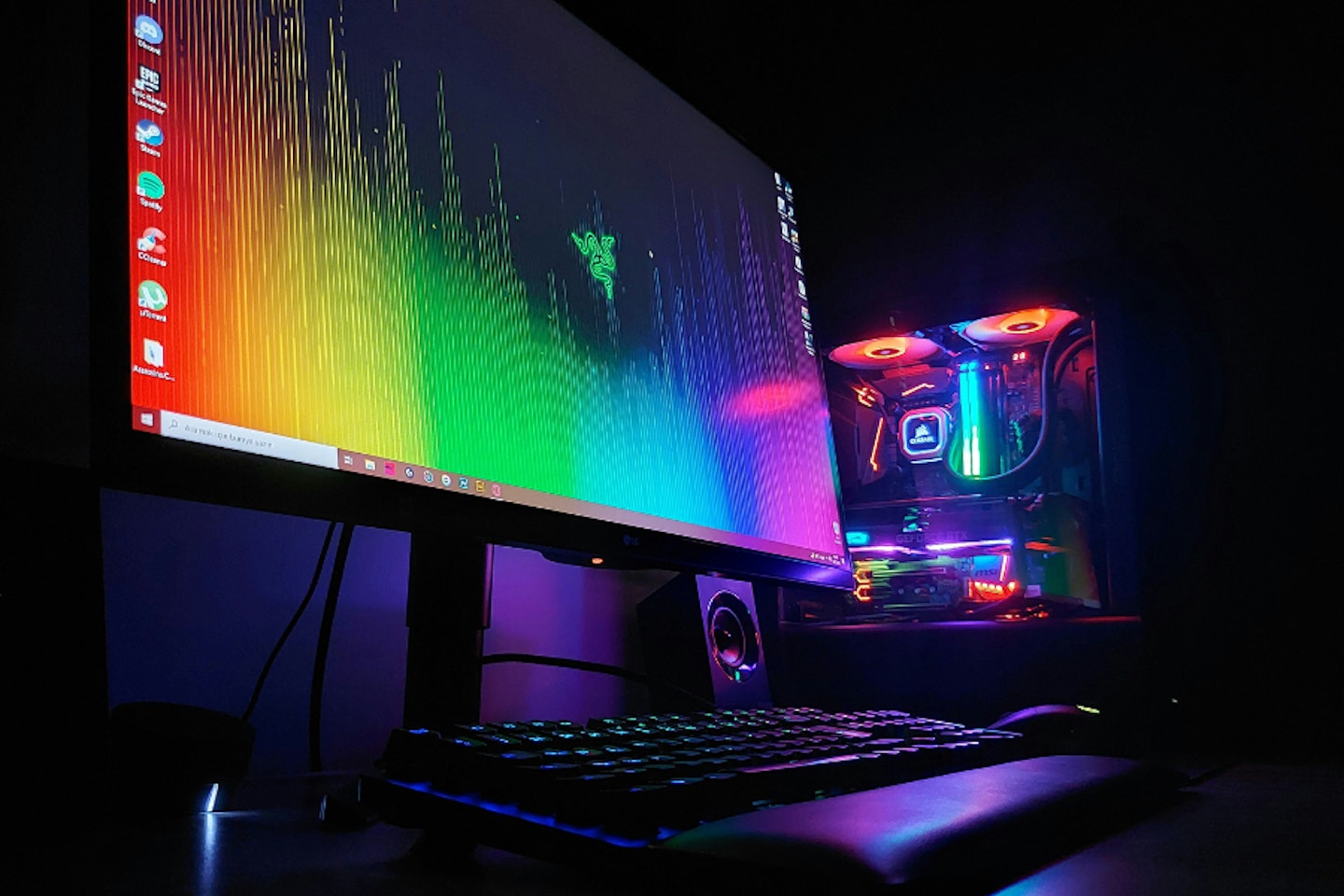
FAQs
So, what's the best budget gaming PC?
Our pick would be the ADMI | Gaming PC, Intel 12400F. It strikes a great balance between affordability and performance. It features important specs like an RTX 4060 GPU, 16GB RAM, and a 1TB SSD, all while managing to stay as a simple and realiable budget-friendly PC. It's more than capable of handling plenty of gaming action and easily keeps up with more expensive models.
What key features should I look for in a gaming PC?
If you’re a newcomer to the PC gaming world, here are a few things to look out for to ensure that you’re getting a good system, even if it’s cheap.
CPU – The brain of your PC needs to be able to think quickly. Aim for no less than 3.5 GHz, unless you prefer older or more basic titles. 4GHz is a strong place to start if you can get it.
RAM – This helps your CPU perform, improves load times and helps multitasking. Gamers will want a minimum of 8GB, but 16GB is more comfortable and a little more futureproof.
Graphics Card – Not entirely necessary on an entry-level system or for those with basic gaming needs, but nice if you can get it – it’ll help speed up the system and smooth out the display. Remember, once you’ve bought your system you can always add in a graphics card to improve performance – it’s a simple and highly satisfying upgrade.
Storage – An SSD is the dream ticket - they seriously reduce load times and can improve game performance. However, the ones included in budget rigs tend to have a small capacity. An HDD with 500GB or 1TB capacity coupled with these smaller SSDs is ideal, or you can upgrade to one of the best SSDs yourself for a surprisingly modest price.
Is a gaming PC better than a normal PC?
Whether a gaming PC is better than a normal PC is hard to say – it depends on the PCs in question. If you look at the essential components (Motherboard, CPU, RAM, HDD, SSD, etc.), you’ll see that they are both just computers. It’s the quality and performance of the components that make the difference.
A PC that has been built for gaming will typically have a faster CPU, more RAM and additional components, like a graphics card, which optimises the system’s performance making it more capable of handling large amounts of data efficiently and quickly. It’s these qualities that lend themselves to gaming. There’s nothing inherently ‘different’ about the systems.
Technicalities and the infinite variables aside, an optimised gaming PC is better for gaming than a standard, normal PC.
What's the best amount of RAM?
If you can afford it, 16GB. However (you’ll sense a running theme here), the answer to this question can change a little depending on your need. A gamer who spends all their time with Minecraft is going to have vastly different needs to the dedicated Microsoft Flight Simulator pilot.
As a general rule of thumb, a gamer is going to want no less than 8GB of RAM – DDR4 if possible, but DDR3 is more than acceptable for a newcomer's budget rig. This is going to see you running a swathe of games with a decent performance. Those who know that they are aiming to play resource-heavy games, or looking to futureproof their system, are going to want to aim for around 12GB to 16GB.
We’d recommend checking the recommended specs on the games you want to play and go from there. Remember that a solid RAM GB count is going to offer you benefits outside of gaming. With 8GB to 16GB of RAM, a system will have enough grunt to run image, music and film editing software and general multitasking.
Can RAM affect FPS?
RAM is only one element to consider when you’re looking to maximise your FPS (frames per second). The RAM that you find on your motherboard helps your CPU. As the brain of your system, the more space and speed your RAM can give the CPU, the better as it increases load times and improves general performance. Having said this, RAM shouldn’t be the first place you look when you’re worried about FPS.
The RAM on your GPU is more important. This RAM is dedicated solely to holding visual information (hopefully freeing up your motherboard's RAM and CPU reserves, too). If the RAM on your graphics card is low (sub-4GB), then HD gaming will be tricky and this is where you’ll want to make some changes.
Here's a quick video from Techquickie for more information on RAM:
Why should you trust us?
At What's The Best, our mission is to provide accurate and reliable reviews, ensuring our readers receive honest and transparent information about the best technology products available. Anything less would undermine our commitment to being a trusted source of unbiased product information.
Our dedicated in-house writing team comprises experts with extensive experience and a genuine passion for technology. Collectively, we have spent decades testing and writing about tech, leveraging our expertise in all our articles, advice pieces and reviews.
We maintain complete editorial independence and do not accept payment for product reviews. Our writers have full control over their content, ensuring that products are selected based solely on the needs of our readers. While we may earn commissions or other compensation from links on our website, this never affects our product choices. These links enable us to continue offering valuable consumer advice, without compromising the integrity of our reviews.
William Austin-Lobley is the Editor for What's The Best. Here, he oversees, curates and researches listicles and reviews as many products as his home office can handle.
He has spent nearly five years writing about tech, audio, outdoors and fitness and has reviewed everything from smartphones to ice baths. In addition, he's well-versed in sniffing out the best deals and savings the internet offers.
When not at his desk writing, reviewing or deal-hunting, he'll be relaxing with Japanese crime novels, bingeing some classic anime, strolling the countryside or at the gym listening to the heaviest metal Spotify has to offer.
Subscribe to the What’s The Best Newsletter to keep up to date with more of the latest reviews and recommendations from the What’s The Best team.
